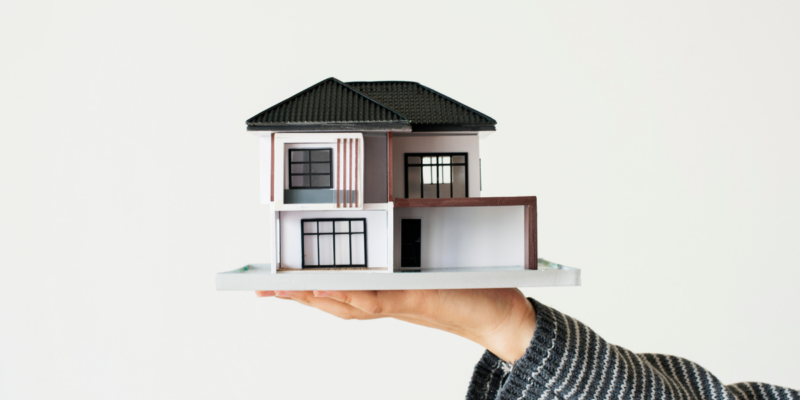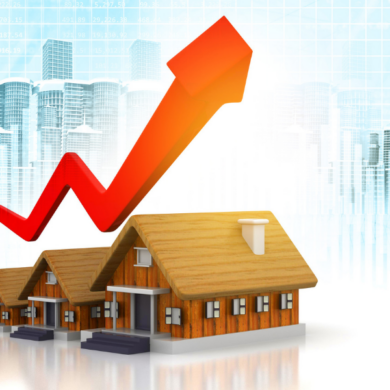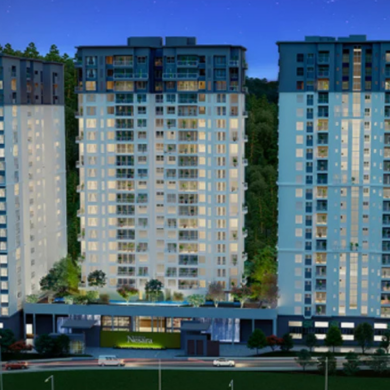
Buying vs Renting a Home: Which is Better? This depends on your financial situation, lifestyle, and long-term goals. For your final choice, evaluate both options basis the information given in this blog.
Determining between buying vs renting a home is a significant financial choice that impacts your lifestyle, convenience, and long-term investment. Buying a home offers stability, equity building, and the freedom to customise your space.
In contrast, renting provides flexibility, lower upfront costs, and reduced maintenance responsibilities. In this blog, you will explore the pros and cons of homeownership vs renting, key factors to consider, and financial comparisons to help you decide which option is better for you.
Table of Contents
Understanding the Basics
Buying a home means gaining ownership, building equity, and committing to a loan. As a homeowner, you have complete control over the property – allowing customisation and long-term investment growth.
In contrast, renting a home involves leasing a property for a fixed period without building equity. Renting offers flexibility, lower upfront costs, and freedom from maintenance responsibilities, but does not provide long-term financial gains. By the end of this blog, you would be in a position to answer the question: is it better to rent or buy a home?
Pros and Cons of Buying a Home
Buying a home is a significant financial decision that offers unique advantages and challenges. Understanding the pros and cons of buying a home helps you make an informed choice, that aligns with your lifestyle needs and long-term goals.
-
Pros of Buying a Home
Building Equity: Homeownership allows you to build wealth over time, as you pay off the loan and property values appreciate, increasing your net worth
Stability and Freedom: Owning a home provides a sense of permanence, stability, and the freedom to customise your space to suit your lifestyle and preferences
Tax Benefits: Homeowners can benefit from potential tax deductions – such as loan interest and property taxes – reducing overall tax liabilities
Long-term Investment: Real estate is a valuable long-term investment that appreciates over time, offering financial security and wealth accumulation
Lifestyle benefits: The shift in lifestyle preferences has reignited the rent vs buy discussion, especially in urban centres -
Cons of Buying a Home
High Upfront Costs: Buying a home involves significant upfront costs, including down payment, stamp duty, registration charges, property tax, monthly EMIs, quarterly maintenance charges, interior design cost, and other fees – impacting your savings and budget. To decide between homeownership vs renting, you should do careful financial planning, and hire a consultant if needed.
Long-term Commitment: It ties you to a home loan for years or even decades, requiring long-term financial stability and commitment
Pros and Cons of Renting a Home
Renting a home offers unique benefits and challenges that influence your lifestyle, financial planning, and long-term goals. Understanding the pros and cons of renting a home helps you take an informed decision that suits your needs and circumstances.
-
Pros of Renting a Home
Lower Upfront Costs: Renting requires security deposit and monthly rent, which is significantly lower than the down payment and many other costs involved in buying a home. This makes it easier to manage your finances and savings.
No Maintenance Responsibilities: As a tenant, you are not responsible for repairs and property upkeep, as landlords handle maintenance. This reduces unexpected expenses and stress.
-
Cons of Renting a Home
No Equity Building: Unlike homeownership, rent payments do not contribute to ownership or equity building, limiting long-term financial growth
Rent Increases: Rental costs can increase over time due to market demand or renewals of rental agreements – impacting your budget and financial stability
5 Key Factors to Consider While Deciding
Choosing between buying vs renting a home is a significant financial and lifestyle decision. By evaluating the key factors described below, you can take an informed decision that aligns with your needs and long-term goals.
-
Financial Situation
While considering rent vs buy, evaluate your budget, flexibility needs, and investment potential. Buying involves upfront costs such as down payment and loan EMI payments, whereas renting requires security deposit and monthly rent payments. Analyse your financial health to ensure long-term stability and security.
-
Lifestyle Preferences
Is it better to rent or buy a home? The answer depends on your lifestyle preferences, including the need for stability or flexibility, family size, and future plans. If you seek permanence, customisation, and community roots, buying is ideal, while renting provides the flexibility needed for mobility, career changes, or exploring new locations.
-
Location
Homeownership vs renting plays a vital role in property value, convenience, and lifestyle satisfaction. Consider housing market trends, job opportunities, and cost of living in your preferred area. If you prioritise short commutes and proximity to schools or workplaces, buying in a strategic location enhances your daily experience.
-
Time Horizon
How long you plan to stay in the area, influences whether buying or renting is more suitable. Buying is a long-term investment that gains value over time, making it ideal if you plan to settle for at least 5 years. However, if you anticipate relocation due to career or lifestyle changes, renting offers greater flexibility and fewer financial obligations.
-
Market Conditions
The homeownership vs renting decision is also influenced by market conditions – such as interest rates, home prices, and rental availability – that directly impact affordability and investment potential. Low interest rates and stable housing market favour buying, while high home prices and competitive rental markets may make renting a more cost-effective option. Monitor market trends to take a strategic decision that maximises value and financial security.
Read More: How to buy a home in 2025. Everything you should know
Financial Comparison: Buying vs. Renting
While deciding between buying vs renting a home, understanding the financial implications is important for making an informed choice. By comparing the costs involved in both options over 5-10 years, you can determine which one suits your financial goals and lifestyle needs. Described below is an example of buying a home worth ₹50 lakhs vs renting a home for ₹20,000 per month.
Buying Scenario
Property Price: ₹50,00,000
Down Payment (20%): ₹10,00,000
Loan Amount: ₹40,00,000
Interest Rate: 7% fixed (assumed)
Loan Tenure: 20 years
EMI = ₹31,000
Maintenance = ₹50,000 per year
Property Tax, Insurance, Miscellaneous Costs = ₹20,000 per year
1. Total Cost for 5 years
| Expense | Calculation | Amount |
| Down Payment | One-time payment | ₹10,00,000 |
| EMI Payments | ₹31,000 × 12 × 5 | ₹18,60,000 |
| Maintenance | ₹50,000 × 5 | ₹2,50,000 |
| Other Costs (Tax, Insurance, etc.) | ₹20,000 × 5 | ₹1,00,000 |
| Total Cost Over 5 Years | ₹32,10,000 |
2. Potential Equity Built
This works out to ₹5,48,000 – which is the principal paid over 5 years.
Total EMIs paid in 5 years is ₹18.6 lakhs, in which principal is on the lower side. This is because, interest component is higher and principal component is lower in the initial years. Interest is charged on outstanding loan balance, and the loan is ₹40,00,000 in the first month – so the interest is high. As the loan decreases every month, the interest component reduces and the principal component increases, to keep the EMI constant.
3. Property Appreciation (assuming 5% per year)
Future Price = Current Price x (1 + Appreciation Rate)^(No. of years)
Future Price = 50,00,000 x (1.05)^5 = 50,00,000 x 1.276
Future Price = ₹63,81,000
Appreciation in 5 years = Future Price – Current Price
Appreciation = 63,81,000 – 50,00,000
Appreciation = ₹13,81,000
Renting Scenario
| Year | Monthly Rent | Annual Rent | Total Paid |
| Year 1 | ₹20,000 | ₹2,40,000 | ₹2,40,000 |
| Year 2 | ₹21,000 | ₹2,52,000 | ₹4,92,000 |
| Year 3 | ₹22,050 | ₹2,64,600 | ₹7,56,600 |
| Year 4 | ₹23,153 | ₹2,77,836 | ₹10,34,436 |
| Year 5 | ₹24,310 | ₹2,91,720 | ₹13,26,156 |
*assuming 5% annual increase in rent
2. Opportunity Cost of Investing the Down Payment
Instead of paying ₹10,00,000 for the down payment, the tenant can invest it in any financial instrument. Assuming it yields 8% returns annually, the monetary gain in 5 years would be:
₹10,00,000*8%*5 = ₹4,00,000
Final Comparison
| Buying | Renting | |
| Total Cost (5 Years) | ₹32,10,000 | ₹13,26,156 |
| Equity Built | ₹5,00,000 | 0 |
| Property Appreciation | ₹13,81,000 | 0 |
| Total Gain from Buying (Equity + Appreciation) | ₹18,81,000 | 0 |
| Opportunity Cost of Down Payment | ₹4,00,000 | |
| Net Cost (Total Cost – Total Gain) | 32,10,000 – 18,81,000 = ₹13,29,000 | 13,26,156 – 4,00,000 = ₹9,26,156 |
Buying a home costs more than renting a home in 5 years – if equity built, property appreciation, and opportunity cost of down payment are taken into consideration. However, over a longer period of time, both costs may converge, as the property appreciates further and equity built rises in value.
Is it better to rent or buy a home? By evaluating your financial situation, lifestyle needs, and long-term goals, you can choose between homeownership vs renting that maximises value and financial security.
10 Common Myths About Buying and Renting
While deciding between buying vs renting a home, misconceptions could cloud your judgment and impact your financial choices. By debunking these common myths, you can take informed decisions that aligns with your lifestyle needs and long-term goals.
-
5 Myths About Buying a Home
Myth 1: Buying is Always Better Than Renting
Truth: Buying is not always the better option. It depends on your financial situation, lifestyle preferences, and long-term goals. Rent vs buy decisions depend on your financial situation, lifestyle preferences, and long-term goals.Myth 2: You Need 20% Down Payment to Buy a Home
Truth: While a 20% down payment reduces loan costs, it is not mandatory. Many lenders offer home loans with lower down payments, such as 10%, depending on your credit score and financial profile.Myth 3: Renting is Throwing Away Money
Truth: Renting provides flexibility in movement and freedom from maintenance costs, which can be beneficial for short-term living or uncertain career plans. Additionally, renting allows you to invest savings elsewhere, possibly yielding better financial returns.Myth 4: Real Estate Always Appreciates in Value
Truth: Property values can fluctuate based on market conditions, location, and economic factors. While real estate can appreciate over the long term, there are risks of depreciation, especially in oversupplied or economically declining areas.Myth 5: Once You Buy a Home, You Are Set for Life
Truth: Homeownership comes with ongoing expenses such as maintenance, property taxes, and loan payments. Additionally, lifestyle changes, career relocations, or market downturns may require selling the property – impacting long-term stability.5 Myths About Renting a Home
Myth 1: Renting is Just Temporary
Truth: Renting is a viable long-term housing option, especially in high-cost markets or for those who prefer flexibility. Many tenants choose to lease for extended periods, due to job mobility or lifestyle preferences.Myth 2: You Cannot Personalise a Rental Home
Truth: While some restrictions apply, many landlords allow tenants to personalise their space with temporary changes – such as removable wallpaper, furniture choices, and decor accents – making even the rented house feel like home.Myth 3: Rent is Always Cheaper Than Loan
Truth: Depending on location, market trends, and interest rates, loan payments can be comparable or even lower than rent payments. Buying also offers the benefit of building equity over time.Myth 4: Renting Means You Have No Financial Security
Truth: Renting provides financial flexibility by avoiding maintenance hassles, property taxes, and market risks. By investing the savings from renting, you can build wealth and achieve financial security.Myth 5: Renting Offers No Stability
Truth: Long-term lease agreements provide stability and predictability, just like homeownership. Additionally, tenants have the advantage of relocating more easily, if personal or career circumstances change.
Conclusion
Deciding between buying vs renting a home depends on your financial situation, lifestyle needs, and long-term goals. Buying offers stability, equity building, and investment potential, but requires high upfront costs. Renting provides flexibility and lower expenses, but lacks equity growth.
By evaluating key factors and debunking common myths, you can take an informed decision that suits your lifestyle and financial future. Choose between rent vs buy to finalise the option that best aligns with your needs and aspirations.
FAQs
1. Is it better to rent or buy a home?
The decision to rent or buy a home depends on your financial situation, lifestyle needs, and long-term goals. Buying builds equity and offers stability, while renting provides flexibility and lower upfront costs.
2. What are the financial benefits of buying a home?
The financial benefits of buying a home are building equity, property appreciation, and tax deductions on loan interest and property taxes – enhancing your long-term wealth.
3. What are the advantages of renting a home?
The advantages of renting a home are flexibility, lower upfront costs, and no maintenance responsibilities – making it suitable for short-term living and lifestyle changes.
4. How do I decide whether to rent or buy?
You can decide whether to rent or buy, by evaluating your financial health, lifestyle preferences, long-term goals, market conditions, and how long you plan to stay.
5. Is renting a waste of money?
Renting is not a waste of money, as it offers flexibility in movement, predictable expenses, and freedom from maintenance hassles, and the choice to invest savings elsewhere.
6. What are the hidden costs of buying a home?
The hidden costs of buying a home are stamp duty, registration charges, maintenance expenses, interior decor, property taxes, and insurance – which add to the overall cost of homeownership.
7. Can I buy a home with a small down payment?
Yes, you can buy a home with a small down payment such as 10% of the home cost, but this may require loan insurance and would depend on your credit rating, income, savings, assets, liabilities, and other factors.
8. How does home appreciation affect my investment?
Home appreciation increases your property's value over time, building equity and enhancing your investment returns, but market fluctuations can affect growth.
9. What are the risks of renting a home?
The risks of renting a home include rent increases, non-renewal of rent agreement, limited customisation, and no equity building – impacting long-term financial security.
10. What are the risks of buying a home?
The risks of buying a home include property value depreciation, high maintenance costs, long-term financial commitment, and no flexibility to relocate. These risks lead tenants and homebuyers to ask the question: ‘is it better to rent or buy a home?’







